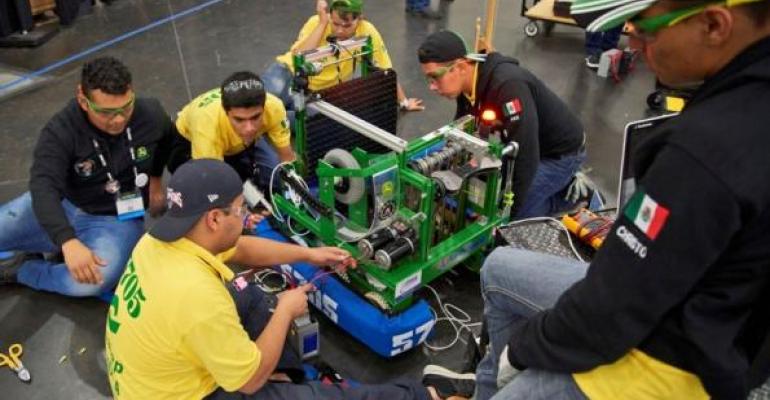Charlie Ackerman’s approach to recruiting future engineers for automotive supplier Robert Bosch is similar to how Major League Baseball prepares its future stars.
Bosch sponsors farm teams for future talent. It has 21 high school FIRST Robotics teams in eight states, Mexico and Canada mentored by 73 Bosch engineers. They help more than 1,000 students design and build robots for six weeks in winter. In early spring, the robots compete with and against each other in tournaments.
FIRST – For the Recognition of Science and Technology – has outgrown a single city for its premier event. Detroit and Houston each will host 400 teams a week apart in late April. According to FIRST, the four-day Detroit event can expect 80-90 qualifying teams from Michigan, which has 509 teams. That is more than any other state. A big reason: So many OEMs and suppliers offer volunteer mentors.
FIRST has 3,675 robotics teams globally. And it sponsors younger kids in three feeder programs – First Lego League Jr., FIRST Lego League and FIRST Tech Challenge. All point to FIRST Robotics.
“It really has developed since we got into this zone of saying the workforce of the future is going to require skills we’re not going to have,” says Ackerman, senior vice president-human resources at Bosch. “We started leveraging the FIRST organization, and it has grown tenfold since 2008.”
Tim Grewe, general director-electrification program execution at General Motors, oversees about 100 company-sponsored teams, many with longstanding ties to its far-flung operations. GM tries to mentor each team it funds, but even when a business moves or closes, the money for the FIRST team stays.
“When we’ve got a strong team, we want to keep it strong,” says Grewe, whose sons were on a world champion team a few years ago. “The most important thing is to keep getting the kids exposed to science and engineering.”
GM has no hard targets for recruiting through FIRST, but “it’s a natural place we pull from because we’ve been doing it so long,” Grewe says.
Retired GM Chief Technology Officer Tom Stephens made GM a founding sponsor of FIRST. He says hundreds of FIRST alumni work for GM. “I feel so blessed to have found out about it on the ground floor. We embraced it. We were proactive. Come hell or high water, we kept the funding for it.”
The costs of building a robot, entry and travel to tournaments run into the thousands, but it is “less than the average football team,” says Don Bossi, president of FIRST. “We use the sports model, but we’re not about exclusivity and elitism.”
Many companies, schools and government agencies offer tens of millions in college scholarships for FIRST students.





